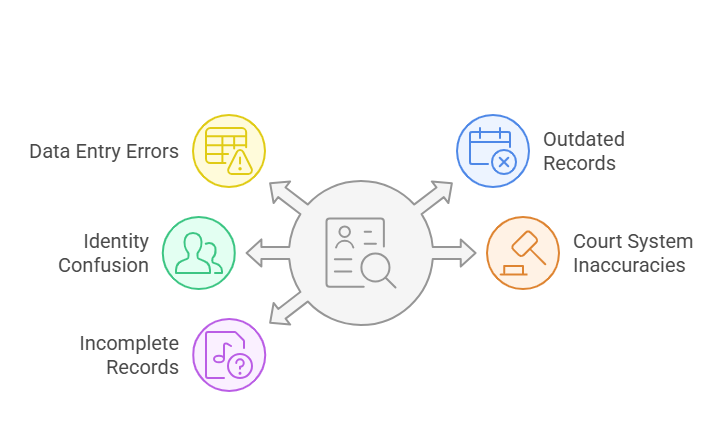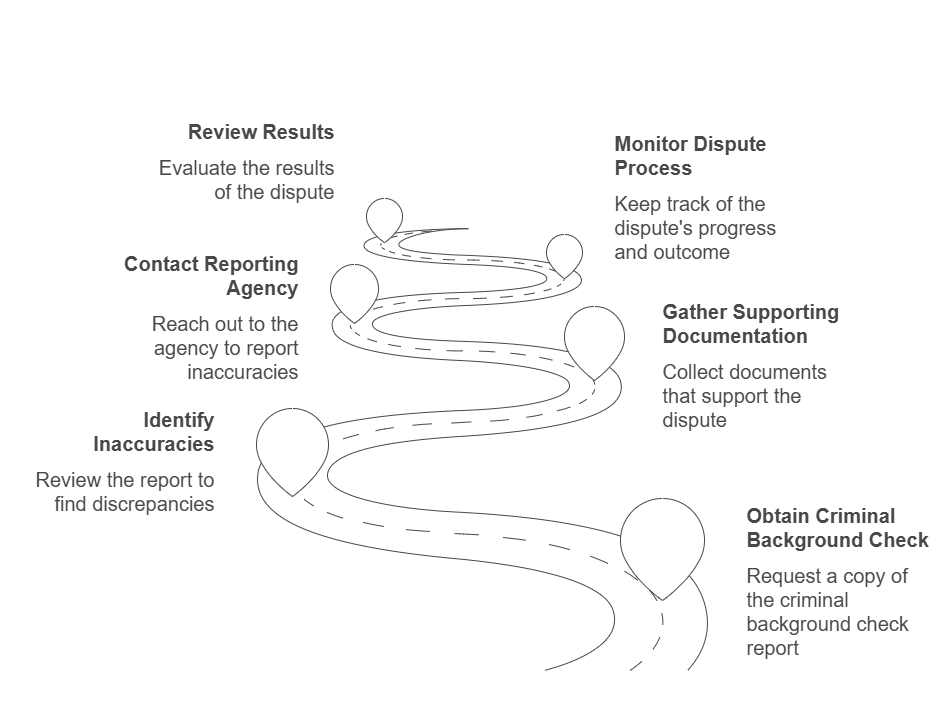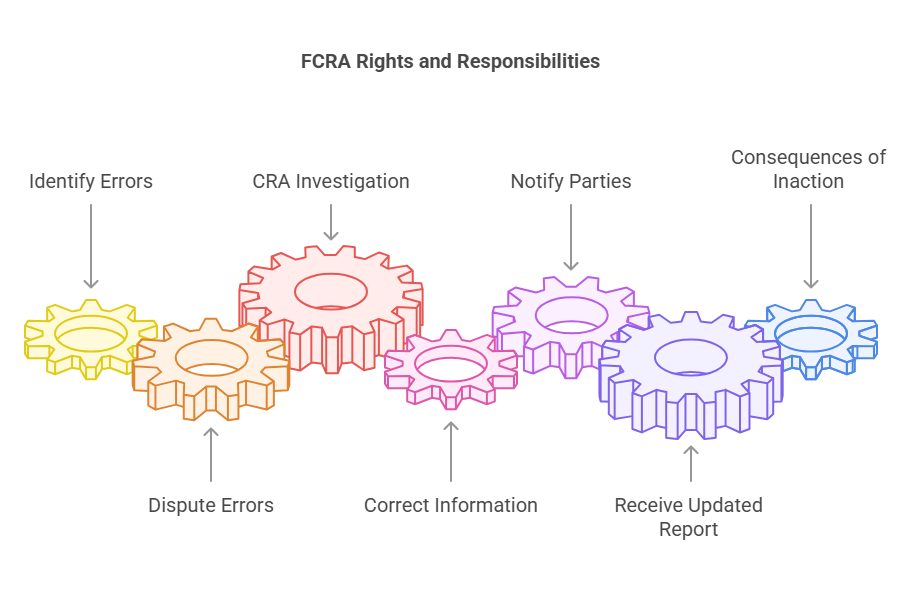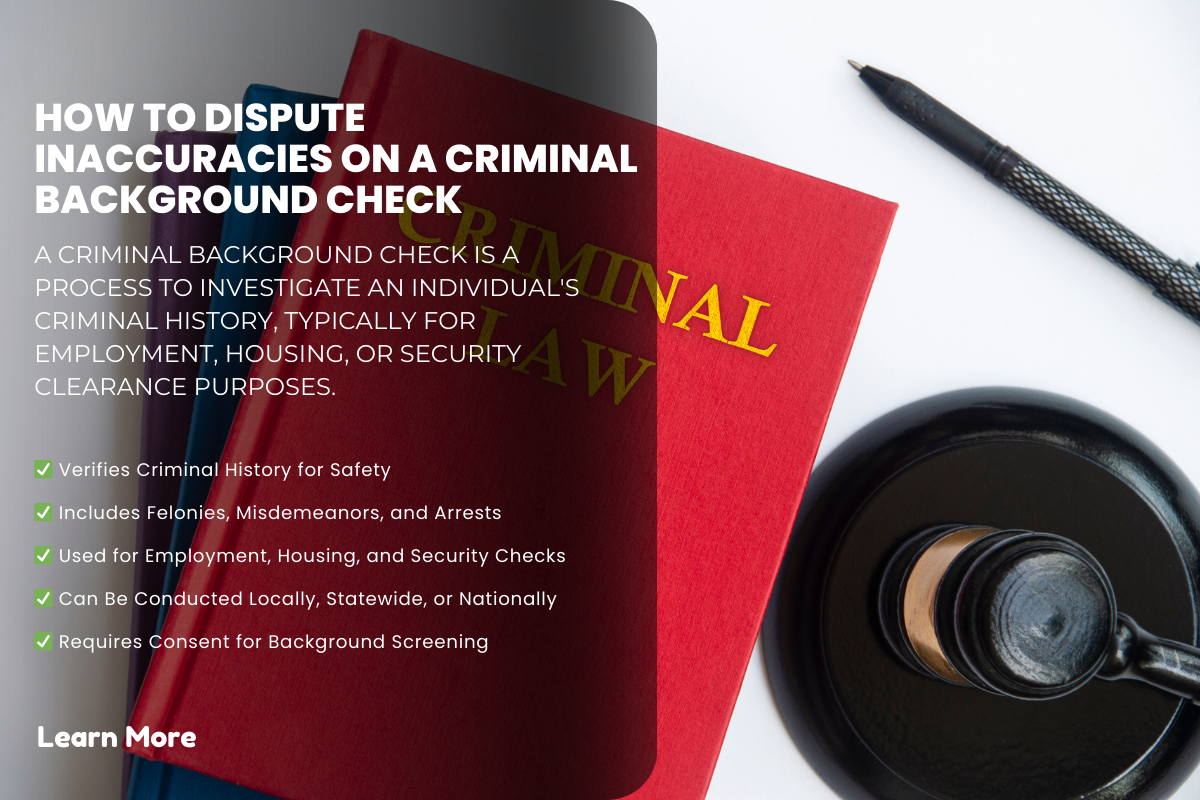Introduction and Overview – How Do You Dispute Inaccuracies on a Criminal Background Check?
In today’s competitive job market, background checks have become a standard part of the hiring process. Employers rely on these checks to ensure that potential employees meet specific criteria and are trustworthy. However, a criminal background check is not always flawless. Inaccuracies can appear due to clerical errors, outdated information, or incorrect data reporting, which can significantly affect a job applicant’s chances. So, how do you dispute inaccuracies on a criminal background check? This article will explore this critical process in detail, helping both job seekers and employers understand how to effectively manage and resolve background check disputes.
What Is a Criminal Background Check?
A criminal background check is an investigative process that gathers information about a person’s criminal history, typically from law enforcement agencies, courts, and other relevant institutions. Employers use this check to evaluate an individual’s suitability for a position, particularly in industries where safety, trust, and legal compliance are critical. Criminal background checks typically include information about past arrests, charges, convictions, and sometimes even pending cases.
Why Do Inaccuracies Occur in Criminal Background Checks?

Despite the thorough nature of criminal background checks, errors and inaccuracies are not uncommon. Here are some reasons why mistakes may occur:
- Data Entry Errors: Human errors during the manual entry of information into databases can lead to incorrect criminal records being attached to an individual’s name.
- Outdated Records: Sometimes, criminal records from years ago may still appear on a background check if they haven’t been updated or removed, even if the charges were dropped or the individual was acquitted.
- Identity Confusion: Cases of mistaken identity can arise, especially if the individual shares a name with someone who has a criminal record. This can result in incorrect criminal history being linked to an innocent person.
- Court System Inaccuracies: The court systems and law enforcement agencies rely on various databases, and discrepancies between them can lead to errors in the background check report.
- Incomplete Records: Criminal records may be incomplete due to technical issues or because certain offenses were not properly documented in the database.
The Significance of Accurate Background Checks
For both employers and job seekers, it’s crucial to ensure that criminal background checks are accurate. For employers, relying on inaccurate background checks can lead to hiring unqualified candidates or missing out on valuable talent. Misleading criminal records can result in poor hiring decisions, potential legal ramifications, and even damage to the company’s reputation.
For job seekers, an inaccurate criminal record can hinder their job prospects, especially in industries that require a clean record. Inaccurate information may also lead to a breach of privacy rights, particularly if the information is not relevant to the job position.
Disputing Inaccuracies on Criminal Background Checks
Disputing inaccuracies on a criminal background check is a process that requires diligence and careful attention. If you notice errors on your criminal record, it’s essential to address them as soon as possible to avoid any negative implications for your job search. Disputing these inaccuracies involves communicating with the relevant authorities, providing evidence, and following the necessary legal channels to correct the record.
In this article, we’ll walk through the entire process of disputing criminal background check inaccuracies, from identifying errors to resolving them. By understanding the dispute process, you can help ensure that your criminal background check accurately reflects your history, thus improving your chances of securing employment.
Steps to Dispute Inaccuracies on a Criminal Background Check

When it comes to disputing inaccuracies on your criminal background check, the process involves several steps, including gathering evidence, contacting the agencies responsible, and following up to ensure that the errors are corrected. Let’s break down the process:
- Obtain a Copy of Your Criminal Background Check Before you can dispute any inaccuracies, you need to review the report thoroughly. Request a copy of the background check from the agency that provided the information. Federal law allows you to obtain a free copy of your report once every 12 months from the three main credit reporting agencies (Equifax, Experian, and TransUnion), and other services may also provide access to criminal background checks.
- Identify the Inaccurate Information After reviewing your criminal background check, identify the inaccuracies. These could be in the form of criminal charges that don’t belong to you, incorrect dates, or convictions that have already been resolved. Document each of the discrepancies you notice for later reference.
- Gather Supporting Documentation To dispute inaccuracies, you’ll need to gather supporting documents to prove that the information is incorrect. This can include court documents, arrest records, or any official documents showing that the charges were dropped or dismissed. If there is an error in your name or identifying information, provide proof of your identity, such as a driver’s license or passport.
- Contact the Reporting Agency Once you’ve identified the errors and gathered supporting documents, the next step is to contact the agency that provided the criminal background check. The Fair Credit Reporting Act (FCRA) mandates that background check agencies must investigate any disputes and correct any inaccuracies within a certain time frame.In most cases, you will need to submit a formal dispute in writing or through an online portal. Be sure to include all relevant documentation and a clear explanation of why the information is incorrect.
- Follow Up After submitting your dispute, it’s important to follow up with the agency to track the progress of your case. The dispute process can take up to 30 days, so it’s essential to stay in touch with the reporting agency and ensure that they are addressing the issue.
- Review the Results Once the agency completes their investigation, they will send you the results. If the inaccuracies are corrected, ensure that your background check is updated accordingly. If the dispute is not resolved in your favor, you may appeal the decision or consult with a legal professional for further steps.
What Are the Common Mistakes Found in Criminal Background Checks?
Several mistakes can appear on criminal background checks. These common errors include:
- Name Mismatches: A frequent issue is having a similar name to someone with a criminal history, which can lead to confusion.
- Outdated Charges: Charges that have been dismissed or expunged may still appear on your background check.
- Inaccurate Criminal Records: Sometimes, the check may include wrong criminal convictions or arrest records that don’t apply to you.
- Incorrect Dates or Case Information: Dates related to charges, arrests, or convictions may be wrong, affecting the accuracy of the background check.
How Long Does It Take to Resolve a Dispute Regarding a Criminal Background Check?
The resolution timeline for a criminal background check dispute can vary depending on the complexity of the issue and the response time of the reporting agency. Typically, the process takes around 30 days, as required by the FCRA. However, it may take longer if additional investigations or legal actions are required.
Process and Best Practices for Disputing Inaccuracies on a Criminal Background Check
Now, let’s delve into the detailed process of disputing inaccuracies on a criminal background check, including actionable steps, best practices, and the resources available to help resolve the issue. Whether you’re an individual facing a background check dispute or an employer navigating the process, understanding the steps involved is crucial to ensuring that inaccuracies are addressed promptly and accurately.
Step-by-Step Process for Disputing Inaccuracies on a Criminal Background Check

When you identify discrepancies on your criminal background check, it’s essential to dispute them as quickly as possible. Below is the step-by-step guide to disputing inaccuracies:
Step 1: Obtain a Copy of Your Criminal Background Check
The first step in disputing an inaccuracy is to obtain a copy of the criminal background check report. Under the Fair Credit Reporting Act (FCRA), you are entitled to request a free report once a year from the major credit bureaus (Equifax, Experian, and TransUnion). In addition, other providers offer access to criminal background checks, including government websites, online background check services, or private agencies. Be sure to get a copy from the agency that provided the report to identify any potential errors.
Step 2: Identify Inaccuracies in the Report
Once you have received your criminal background check, go through it thoroughly to identify any discrepancies. Common errors can include:
- Incorrect Criminal History: This may include arrests or convictions that don’t belong to you, or outdated information.
- Mistaken Identity: Sometimes people with similar names or birthdates may have their criminal history mistakenly linked to your record.
- Errors in Date or Location: This could include the wrong dates or locations for criminal charges or convictions.
Take detailed notes on what seems inaccurate and organize the specific issues that need to be addressed.
Step 3: Gather Supporting Documentation
To resolve the inaccuracies, it’s essential to gather supporting documentation. This is key for proving that the information on your background check is incorrect. The supporting documents you’ll need may vary based on the type of dispute:
- Court documents showing that charges were dropped, dismissed, or that you were acquitted.
- Arrest records indicating no charges were filed or showing the case was cleared.
- Identity proof such as government-issued IDs to demonstrate that you are not the individual linked to a criminal record.
Having this evidence ready will help make your case stronger when disputing the inaccuracy.
Step 4: Contact the Reporting Agency or Provider
Once you’ve identified the inaccuracies and gathered supporting documentation, the next step is to contact the agency that issued the report. This could be a credit bureau or a private background check service. In the case of FCRA violations, these agencies are legally required to investigate disputes within 30 days.
There are different methods for contacting the agency, depending on the provider:
- Online Portal: Many reporting agencies offer online portals where you can submit disputes directly.
- Written Dispute: Some agencies may require disputes to be submitted in writing, and they will typically provide instructions on how to proceed. Make sure to include all supporting documents with your dispute.
- Phone or Customer Support: Some agencies may allow you to dispute inaccuracies over the phone. However, it’s always best to get the dispute in writing to ensure documentation is available.
Be clear, concise, and provide all the necessary documentation that supports your claim.
Step 5: Monitor the Dispute Process
After submitting the dispute, the reporting agency is required to investigate within 30 days. During this time, monitor the dispute’s progress. You can contact the agency to confirm they received your submission and inquire about the status of your case. Keeping track of the dispute helps ensure that it is handled in a timely manner.
Step 6: Review the Results of the Dispute
Once the dispute is resolved, the agency will provide you with the results. If the inaccuracies have been corrected, request an updated criminal background check to ensure that your report accurately reflects your criminal history. If the dispute is not resolved in your favor, you have the right to appeal the decision or pursue legal action if necessary.
Step 7: Follow-Up and Escalation
If the dispute is not resolved to your satisfaction, you may need to escalate the issue. Here are a few options to consider:
- Appeal the Decision: You can file an appeal with the reporting agency if you believe that the investigation was incomplete or failed to properly assess the evidence.
- Contact the Consumer Financial Protection Bureau (CFPB): The CFPB provides resources for consumers who have issues with background check agencies. If a provider fails to comply with FCRA regulations, you can file a complaint.
- Seek Legal Advice: In cases where the dispute process is complex or your legal rights are being violated, it may be beneficial to consult an attorney who specializes in employment law or FCRA compliance.
Tips to Improve Your Chances of Disputing Inaccuracies Successfully
Disputing inaccuracies on your criminal background check can sometimes feel like a complex process, but following best practices can improve your chances of success. Here are some helpful tips:
- Be Organized: Ensure that all the supporting documents are organized and that your dispute is clear and concise. Submit everything at once to avoid delays.
- Act Quickly: The sooner you dispute inaccuracies, the quicker they can be resolved, ensuring that the inaccurate information doesn’t negatively impact your job search or employment prospects.
- Stay Persistent: If you don’t get the resolution you want initially, stay persistent. Follow up regularly with the agency and keep track of any updates.
- Check the Dispute Results Carefully: Once the dispute has been resolved, don’t just assume everything is accurate. Double-check the results to make sure your record has been corrected.
How Rapid Hire Solutions Can Help with Criminal Background Check Disputes
At Rapid Hire Solutions, we understand how important it is to ensure that criminal background checks are accurate. Disputing inaccuracies on a criminal background check can be a time-consuming process, and we aim to simplify this for both job seekers and employers.
Our services include:
- Background Check Support: We help guide you through the background check dispute process, ensuring you understand each step and providing resources to help you gather the necessary documentation.
- Dispute Management: We assist with managing the dispute process by working with background check agencies, ensuring that your dispute is processed efficiently and effectively.
- Compliance Assistance: We ensure that all disputes are handled in compliance with the Fair Credit Reporting Act (FCRA) and any other relevant regulations.
By working with Rapid Hire Solutions, you can be assured that you are getting the best support possible when it comes to disputing inaccuracies on criminal background checks.
Common Steps in Disputing Criminal Background Check Inaccuracies Across Different Jurisdictions
While the general process for disputing inaccuracies remains consistent, specific steps may vary depending on the jurisdiction or agency involved. Here’s a quick overview:
| Step | Federal | State (e.g., CT) | Private Provider |
|---|---|---|---|
| Obtain Report | Free annual report (credit agencies) | Contact state police or background check service | Request from service provider |
| Identify Errors | Review criminal record | Verify with state court system | Compare report with personal records |
| Submit Dispute | Online or written submission | Submit to local law enforcement | Submit through agency’s online portal |
| Provide Supporting Evidence | Court documents, identity proof | Court records or case dismissals | Relevant proof of error |
| Resolution Time | Typically 30 days | 30-45 days | Varies by provider, usually within 30 days |
Legal Aspects of Disputing Inaccuracies on a Criminal Background Check
Disputing inaccuracies on your criminal background check involves both consumer rights and regulatory compliance, which are governed primarily by the Fair Credit Reporting Act (FCRA). The FCRA is a U.S. federal law that ensures fair and accurate reporting of consumer information, including criminal history, for background checks used in employment, housing, and other purposes.
Fair Credit Reporting Act (FCRA) and Your Rights

The FCRA establishes guidelines that credit reporting agencies (CRAs) must follow when handling consumer reports, including criminal background checks. Here are some of your rights under the FCRA when disputing inaccuracies:
- Right to Dispute Errors: If you identify any errors on your criminal background check, you have the right to dispute those inaccuracies. The credit reporting agency is legally obligated to investigate and respond within 30 days.
- Right to Request a Free Report: Under the FCRA, you are entitled to receive a free copy of your criminal background report once a year. This allows you to check for errors and dispute them promptly before they affect your job search or employment status.
- Right to Correct Information: If an inaccuracy is found and confirmed, the reporting agency must correct the error and notify all parties who accessed your report. You will also receive an updated report reflecting these changes.
- Right to Notification of Negative Action: If a background check leads to an adverse action, such as a denied job or housing application, the employer or agency must notify you. If the adverse action is based on a background check, you have the right to request a copy of the report before any decision is finalized.
Consequences of Failing to Dispute Inaccuracies
If you fail to dispute inaccuracies in your criminal background check, you could be affected in several ways:
- Lost Employment Opportunities: Employers may make hiring decisions based on inaccurate background information, leading to missed job opportunities.
- Inaccurate Criminal History Record: If errors are not corrected, your criminal record may continue to reflect incorrect information, causing long-term issues in employment, housing, or credit applications.
- Legal Liabilities: In some cases, if the inaccuracies are not disputed and they negatively affect your reputation, you may have the right to pursue legal action against the agency responsible for the error.
The dispute process ensures that you can maintain control over the accuracy of the information used to assess your background.
Frequently Asked Questions (FAQs) About Disputing Criminal Background Check Inaccuracies
Here are some frequently asked questions related to disputing inaccuracies on criminal background checks, with detailed answers to help guide you through the process:
What steps should I take to dispute inaccuracies on a criminal background check?
To dispute inaccuracies on a criminal background check, start by obtaining a copy of the report. Review it carefully to identify any errors, gather supporting documentation (such as court records or proof of identity), and then contact the reporting agency to initiate the dispute. Follow up regularly until the dispute is resolved.
How long does it take to resolve a dispute regarding a criminal background check?
By law, reporting agencies have 30 days to investigate disputes. However, if the dispute is complex or additional documentation is required, the process may take longer. Keep track of the timeline and follow up if necessary.
Can a background check be revised after a dispute?
Yes, a background check can be revised if the dispute is successful. If the inaccuracy is verified and corrected, the reporting agency will update your record and send the corrected version to any parties that have accessed your background check.
What are the common mistakes found in criminal background checks?
Some common mistakes include:
- Mistaken identity (e.g., sharing a name or birthdate with someone else).
- Outdated information (e.g., convictions or arrests that have been expunged or dismissed).
- Incorrect criminal charges (e.g., charges that don’t belong to you).
- Inaccurate dates or locations for offenses.
What impact does disputing a criminal background check have on employment opportunities?
Disputing inaccuracies on your criminal background check can have a significant impact on employment opportunities. If inaccuracies are not corrected, it can lead to a missed job opportunity or even job termination. Correcting any inaccuracies increases the likelihood of successfully securing a job.
Conclusion: Importance of Disputing Inaccuracies and the Impact on Employment Opportunities
Disputing inaccuracies on a criminal background check is not only essential for maintaining the accuracy of your record but also crucial for protecting your employment opportunities and personal reputation. By taking the necessary steps to identify, dispute, and correct errors, you can ensure that potential employers have accurate information when making hiring decisions.
Key takeaways include:
- The importance of reviewing your criminal background check regularly and identifying any discrepancies.
- The step-by-step process for disputing inaccuracies, from gathering supporting documentation to contacting the appropriate agencies.
- Understanding your legal rights under the Fair Credit Reporting Act (FCRA) to ensure fair treatment during the dispute process.
- The potential impact on employment opportunities if inaccuracies are not addressed.
- The role of Rapid Hire Solutions in assisting with the dispute process and ensuring compliance with legal standards.
By following these steps, you ensure that your criminal background check reflects accurate and up-to-date information, which in turn protects your rights and enhances your chances of securing employment. For assistance, consider utilizing services like Rapid Hire Solutions, which provides guidance and expertise in handling criminal background check disputes.
In conclusion, taking action quickly and effectively to resolve any discrepancies in your criminal background check can make a significant difference in your job search and overall career prospects.

